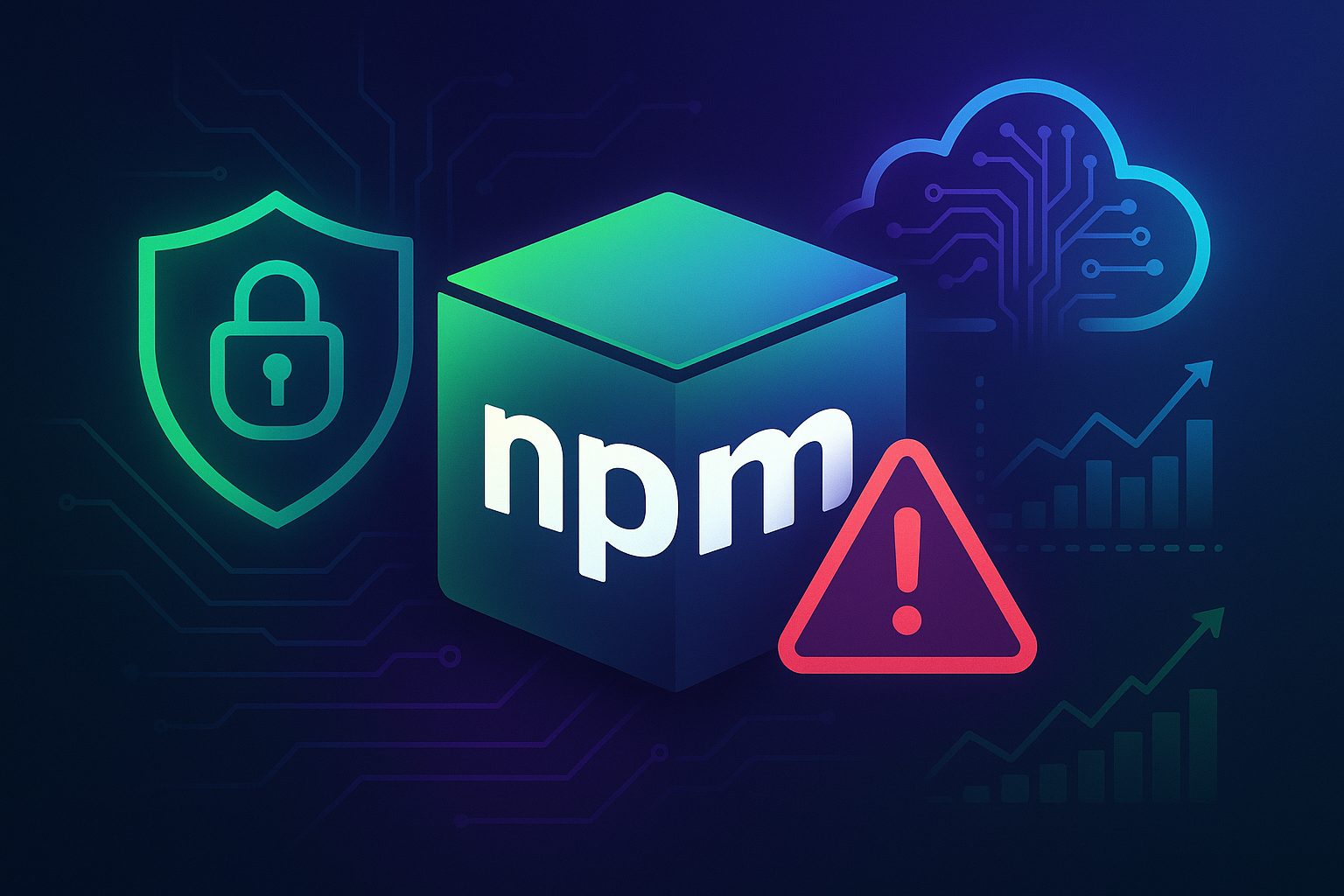NPM Packages Compromised: Understanding the Recent Supply Chain Attack
On September 9, 2025, a major software supply chain attack was uncovered, affecting more than 20 widely-used NPM packages and potentially compromising over 2 billion downloads globally. This alarming incident has sent shockwaves across the developer and cybersecurity communities. The term NPM packages compromised has now become synonymous with the risks inherent in open-source dependencies. This article will explore the details of the attack, the implications for developers and businesses, and how organizations can strengthen their defenses using advanced cybersecurity solutions like those offered by Hodeitek.
These compromised NPM packages were not obscure. They included commonly used libraries that developers integrate into everything from enterprise software to consumer apps. This makes the attack not only severe in its reach but also in its stealth — the malicious code was embedded in trusted packages, going unnoticed for days, if not weeks. The threat actors used these packages as vectors to siphon sensitive data, install malware, and potentially create backdoors into systems using them.
As cybersecurity professionals and developers scramble to contain the damage, this incident offers an urgent reminder: the software supply chain is now a primary attack surface. Understanding the mechanisms of the attack and implementing robust defense strategies is not just best practice — it’s essential. Let’s delve deeper into what happened and what you can do about it.
How the NPM Packages Were Compromised
Initial Breach and Attack Vector
The attackers gained unauthorized access to the NPM accounts of several maintainers, exploiting weak credentials and possibly credential stuffing attacks. Once inside, they published new versions of legitimate packages containing malicious payloads. These backdoored versions were then automatically downloaded by thousands of projects relying on continuous integration and deployment (CI/CD) pipelines.
This technique demonstrates how a small security lapse in developer credentials can lead to massive exploitation. Credential protection and multi-factor authentication (MFA) are no longer optional but necessary for all developers involved in open-source contributions.
Hodeitek’s Vulnerability Management as a Service (VMaaS) can help organizations identify such weak links in their software infrastructure proactively.
Malicious Code Behavior
The malicious code embedded in the compromised NPM packages collected environment variables, authentication tokens, and system metadata. This data was then exfiltrated to attacker-controlled servers. In some cases, the malware also had the capability to execute remote commands, effectively turning affected systems into potential botnet nodes.
This behavior highlights the need for runtime protection. Static code analysis is insufficient when dealing with obfuscated or dynamically loaded threats. Behavioral analytics and endpoint detection become critical in these scenarios.
Using solutions like EDR, XDR, and MDR from Hodeitek can offer the visibility and real-time detection needed to thwart such advanced threats.
Widespread Impact and Propagation
Given that these were popular packages, the propagation was swift and extensive. Projects using package managers to automatically install the latest versions became unwitting victims. The attack has affected a broad spectrum of industries — from fintech to healthcare, SaaS platforms, and even government systems.
This level of propagation is a testament to the deep trust developers place in open-source ecosystems, and how easily that trust can be weaponized. It’s also a case study in why supply chain security must be treated as a first-class concern in software development.
Organizations can mitigate such threats by using Cyber Threat Intelligence (CTI) to monitor for indicators of compromise (IOCs) and emerging risks.
Why Supply Chain Attacks Are on the Rise
Open-Source Dependency Complexity
Modern software applications often depend on hundreds of external libraries. Each dependency brings its own set of risks, including outdated code, unmaintained packages, or potential backdoors. Attackers exploit this complexity by targeting the weakest link — a single package that can grant access to thousands of downstream applications.
This growing complexity demands automation and intelligence in managing dependencies. Manual audits are no longer feasible at scale.
Hodeitek’s Next Generation Firewall (NGFW) can help control and monitor traffic at the application layer to detect unusual behavior stemming from compromised packages.
Inadequate Developer Security Practices
Many open-source developers operate without the robust security frameworks available in enterprise environments. This makes them easy targets for attackers using phishing, social engineering, or brute-force attacks to gain access to package repositories.
Security awareness and training are crucial, as is the implementation of MFA and secure code practices. Organizations that depend on open-source must also contribute to its security — it’s a shared responsibility.
Hodeitek offers SOC as a Service (SOCaaS) to monitor and defend against attacks in real-time, including those arising from code repositories.
Attractive Targets for Threat Actors
Software supply chains have become lucrative targets for threat actors due to their reach and stealth. A single successful compromise can yield access to thousands of systems, data records, or even critical infrastructure.
State-sponsored actors and cybercriminal groups are increasingly shifting focus from direct attacks to exploiting trust relationships in software development. This makes supply chain security an urgent priority across all industries.
Industrial SOC as a Service from Hodeitek is designed to protect critical infrastructure, especially in sectors like manufacturing and energy, from such sophisticated attacks.
Security Lessons from the NPM Packages Compromised
Zero Trust Development Environments
Zero Trust is not just for networks — it applies to software development too. Every component, including internal libraries and third-party packages, should be treated as potentially hostile until proven safe.
This mindset can help prevent assumptions that lead to blind spots. Implementing secure build environments and isolated development pipelines can limit the impact of compromised dependencies.
Hodeitek’s end-to-end cybersecurity services help build secure DevSecOps environments where trust is verified continuously.
Automated Dependency Scanning
Regular scanning of dependencies for known vulnerabilities and suspicious behavior is essential. Tools like Snyk, Dependabot, or custom scripts integrated into CI/CD pipelines can catch issues before they reach production.
However, even the best scanners can miss zero-day exploits. Combining scanning with behavioral analytics and threat intelligence is the most effective strategy.
Hodeitek’s CTI services can augment these tools by providing real-time context and alerts about emerging threats.
Continuous Monitoring and Incident Response
Once malicious code enters your environment, speed of detection and response becomes critical. Continuous monitoring, backed by automated incident response, can contain the damage before it spreads.
Security Operations Centers (SOCs) must be equipped to handle supply chain breaches with specialized playbooks and response strategies.
Hodeitek provides 24×7 SOCaaS and Industrial SOCaaS to detect and respond to incidents in real-time, reducing dwell time and minimizing impact.
Protecting Your Organization from Similar Attacks
Implement Multi-Layered Defense Strategies
No single tool or policy can prevent every attack. Defense-in-depth, combining endpoint protection, firewalls, identity management, and threat intelligence, is the best approach.
This layered security model ensures that if one control fails, others are in place to stop or mitigate the attack. From development environments to production systems, every layer should be protected.
Hodeitek’s cybersecurity stack supports this model with integrated services tailored to your organization’s needs. Explore our full services here.
Establish Software Bill of Materials (SBOM)
An SBOM is a comprehensive list of all components in your software, including dependencies. It’s a critical tool for managing risk and maintaining compliance, especially in regulated industries.
SBOMs allow for rapid identification of affected systems during incidents like the NPM packages being compromised. They also help in conducting audits and fulfilling legal obligations.
Hodeitek assists organizations in generating and managing SBOMs as part of our VMaaS and CTI services.
Engage with Trusted Cybersecurity Partners
Managing all aspects of cybersecurity in-house can be overwhelming. Partnering with experts like Hodeitek brings access to advanced tools, experienced analysts, and proactive threat hunting capabilities.
Our team can help you assess your current security posture, identify gaps, and implement solutions tailored to your industry and risk profile.
Contact Hodeitek today to schedule a consultation and take the first step toward a more secure future.
External References and Further Reading
- The Hacker News: 20 Popular NPM Packages Compromised
- Sonatype Analysis of the NPM Supply Chain Attack
Take Action: Secure Your Software Supply Chain Now
The NPM packages compromised in this recent attack highlight a clear truth — software supply chains are critical attack vectors. Whether you’re a startup or a multinational enterprise, the risks are real and growing. You need proactive, real-time protection that adapts to evolving threats.
Hodeitek offers a full suite of cybersecurity services, including EDR/XDR/MDR, VMaaS, SOCaaS, and more, to help your organization stay ahead of the next breach.
Don’t wait until you’re the next headline. Contact Hodeitek today and secure your software development lifecycle.






